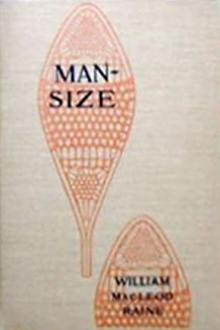Laughing Bill Hyde and Other Stories by Rex Beach (ebook smartphone .TXT) 📗

- Author: Rex Beach
Book online «Laughing Bill Hyde and Other Stories by Rex Beach (ebook smartphone .TXT) 📗». Author Rex Beach
"Perhaps that's what makes a hit with Marmion. She's used to the other kind."
"It seems to me that I have always worked," ruminated the former speaker. "I don't remember that I ever had time to play, even after I came to the city. It's a mighty sad thing to rob a boy of his childhood; it makes him a dull, unattractive sort when he grows up. I used to read about people like Miss Moore, but I never expected to know them until I met you. Of course, that corn deal rather changed things."
"Well, I should rather say it did!" Suydam agreed, with emphasis.
"The result is that when I am with her I forget the few things I have done that are worth while, and I become the farm-hand again. I'm naturally rough and angular, and she sees it."
"Oh, you're too sensitive! You have a heart like a girl underneath that saturnine front of yours, and while you look like the Sphinx, you are really as much of a kid at heart as I am. Where do you ride to-day?"
"Riverside Drive."
"What horse is she riding?"
"Pointer."
The doctor shook his head. "Too many automobiles on the Drive. He's a rotten nag for a woman, anyhow. His mouth is as tough as a stirrup, and he has the disposition of a tarantula. Why doesn't she stick to the Park?"
"You know Marmion."
"Say, wouldn't it be great if Pointer bolted and you saved her life?
She couldn't refuse you then."
Austin laughed. "That's not exactly the way I'd care to win her. However, if Pointer bolted I'd probably get rattled and fall off my own horse. I don't like the brutes. Come on, I'm late."
"That's right," grumbled the other, "leave me here while you make love to the nicest girl in New York. I'm going down to the office and amputate somebody."
They descended the single flight to the street, where Austin's groom was struggling with a huge black.
"It's coming pretty soft for you brokers," the doctor growled, as his companion swung himself into the saddle. "The next time I get a friend I'll keep him to myself."
Austin leaned forward with a look of grave anxiety upon his rugged features and said: "Wish me luck, Doc. I'm going to ask her to-day."
"Good for you, old fellow." There was great fondness in the younger man's eyes as he wrung the rider's hand and waved him adieu, then watched him disappear around the corner.
"She'll take him," he mused, half aloud. "She's a sensible girl even if all New York has done its best to spoil her." He hailed a taxicab and was hurried to his office.
It was perhaps two hours later that he was called on the telephone.
"Hello! Yes, yes! What is it?" he cried, irritably. "Mercy Hospital! What?" The young physician started. "Hurt, you say? Run-away? Go on, quick!" He listened with whitening face, then broke in abruptly: "Of course he sent for me. I'll be right up."
He slammed the receiver upon its hook and, seizing his hat, bolted out through a waiting-room full of patients. His car was in readiness, and he called to his chauffeur in such tones that the fellow vaulted to his seat.
"Go up Madison Avenue; there's less traffic there. And for God's sake hurry!"
During two years' service with New York's most fashionable physician the driver had never received a command like this, and he opened up his machine. A policeman warned him at Thirty-third Street and the car slowed down, at which Suydam leaned forward, crying, roughly:
"To hell with regulations! There's a man dying!"
The last word was jerked from him as he was snapped back into his seat. Regardless of admonitory shouts from patrolmen, the French car sang its growing song, while truck-drivers bellowed curses and pedestrians fled from crossings at the scream of its siren. A cross-town car blocked them, and the brakes screeched in agony, while Doctor Suydam was well-nigh catapulted into the street; then they were under way again, with the car leaping from speed to speed. It was the first time the driver had ever dared to disregard those upraised, white-gloved hands, and it filled his joy-riding soul with exultation. A street repair loomed ahead, whereupon, with a sickening skid, they swung into a side street; the gears clashed again, and an instant later they shot out upon Fifth Avenue. At the next corner they lay motionless in a blockade, while the motor shuddered; then they dodged through an opening where the mud-guards missed by an inch and were whirling west toward Broadway. At 109th Street a bicycle officer stared in amazement at the dwindling number beneath the rear axle, then ducked his head and began to pedal. He overhauled the speeding machine as it throbbed before the doors of Mercy Hospital, to be greeted by a grinning chauffeur who waved him toward the building and told of a doctor's urgency.
Inside, Doctor Suydam, pallid of face and shaking in a most unprofessional manner, was bending over a figure in riding-clothes, the figure of a tall, muscular man who lay silent, deaf to his words of greeting.
They told him all there was to tell in the deadly, impersonal way of hospitals, while he nodded swift comprehension. There had been a runaway—a woman on a big, white-eyed bay, that had taken fright at an automobile; a swift rush up the Driveway, a lunge over the neck of the pursuing horse, then a man wrenched from his saddle and dragged beneath cruel, murderous hoofs. The bay had gone down, and the woman was senseless when the ambulance arrived, but she had revived and had been hurried to her home. In the man's hand they had found the fragment of a bridle rein gripped with such desperation that they could not remove it until he regained consciousness. He had asked regarding the girl's safety, then sighed himself into oblivion again. They told Suydam that he would die.
With sick heart the listener cursed all high-spirited women and high-strung horses, declaring them to be works of the devil, like automobiles; then he went back to the side of his friend, where other hands less unsteady were at work.
"Poor lonely old Bob!" he murmured. "Not a soul to care except Marmion and me, and God knows whether she cares or not."
* * * * *
But Robert Austin did not die, although the attending surgeons said he would, said he should, in fact, unless all the teachings of their science were at fault. He even offended the traditions of the hospital by being removed to his own apartments in a week. There Suydam, who had watched him night and day, told him that Miss Moore had a broken shoulder and hence could not come to see him.
"Poor girl!" said Austin, faintly. "If I'd known more about horses I might have saved her."
"If you'd known more about horses you'd have let Pointer run," declared his friend. "Nobody but an idiot or a Bob Austin would have taken the chance you did. How is your head?"
The sick man closed his eyes wearily. "It hurts all the time. What's the matter with it?"
"We've none of us been able to discover what isn't the matter with it!
Why in thunder did you hold on so long?"
"Because I—I love her, I suppose."
"Did you ask her to marry you?" Suydam had been itching to ask the question for days.
"No, I was just getting to it when Pointer bolted. I—I'm slow at such things." There was a moment's pause. "Doc, what's the matter with my eyes? I can't see very well."
"Don't talk so much," ordered the physician. "You're lucky to be here at all. Thanks to that copper-riveted constitution of yours, you'll get well."
But it seemed that the patient was fated to disappoint the predictions of his friend as well as those of the surgeons at Mercy Hospital. He did not recover in a manner satisfactory to his medical adviser, and although he regained the most of his bodily vigor, the injury to his eyes baffled even the most skilled specialists.
He was very brave about it, however, and wrung the heart of Doctor Suydam by the uncomplaining fortitude with which he bore examination after examination. Learned oculists theorized vaporously about optic atrophies, fractures, and brain pressures of one sort and another; and meanwhile Robert Austin, in the highest perfection of bodily vigor, in the fullest possession of those faculties that had raised him from an unschooled farm-boy to a position of eminence in the business world, went slowly blind. The shadows crept in upon him with a deadly, merciless certainty that would have filled the stoutest heart with gloom, and yet he maintained a smiling stoicism that deceived all but his closest associates. To Doctor Suydam, however, the incontestable progress of the malady was frightfully tragic. He alone knew the man's abundant spirits, his lofty ambitions, and his active habits. He alone knew of the overmastering love that had come so late and was destined to go unvoiced, and he raved at the maddening limits of his profession. In Austin's presence he strove to be cheerful and to lighten the burden he knew was crushing the sick man; but at other times he bent every energy toward a discovery of some means to check the affliction, some hand more skilled than those he knew of. In time, however, he recognized the futility of his efforts, and resigned himself to the worst. He had a furious desire to acquaint Marmion Moore with the truth, and to tell her, with all the brutal frankness he could muster, of her part in this calamity. But Austin would not hear of it.
"She doesn't dream of the truth," the invalid told him. "And I don't want her to learn. She thinks I'm merely weak, and it grieves her terribly to know that I haven't recovered. If she really knew—it might ruin her life, for she is a girl who feels deeply. I want to spare her that; it's the least I can do."
"But she'll find it out some time."
"I think not. She comes to see me every day—"
"Every day?"
"Yes. I'm expecting her soon."
"And she doesn't know?"
Austin shook his head. "I never let her see there's anything the matter with my sight. She drives up with her mother, and I wait for her there in the bay-window. It's getting hard for me to distinguish her now, but I recognize the hoofbeats—I can tell them every time."
"But—I don't understand."
"I pretend to be very weak," explained the elder man, with a guilty flush. "I sit in the big chair yonder and my Jap boy waits on her. She is very kind." Austin's voice grew husky. "I'm sorry to lose sight of the Park out yonder, and the trees and the children—they're growing indistinct. I—I like children. I've always wanted some for myself. I've dreamed about—that." His thin, haggard face broke into a wistful smile. "I guess that is all over with now."
"Why?" questioned Suydam, savagely. "Why don't you ask her to marry you, Bob? She couldn't refuse—and God knows you need her."
"That's just it; she couldn't refuse. This is the sort of thing a fellow must bear alone. She's too young, and beautiful, and fine to be harnessed up to a worn-out old—cripple."
"Cripple!" The other choked. "Don't talk like that. Don't be so blamed resigned. It tears my heart out. I—I—why, I believe I feel this more than you do."
Austin turned his face to the speaker with a look of such tragic suffering that the younger man fell silent.
"I'm glad I can hide my feelings," Austin told him, slowly, "for that is what I have to do every instant she is with me. I don't wish to inflict unnecessary pain upon my friends, but don't you suppose I know what this means? It means the destruction of all my fine hopes, the death of all I hold dear in the world. I love my work, for I am—or I was—a success; this means I must give it up. I'm strong in body and brain; this robs me of my usefulness. All my life I have prayed that I might some time love a woman; that time has come, but this means I must give her up and be lonely all my days. I must grope my way through the dark with never a ray of light to guide





Comments (0)